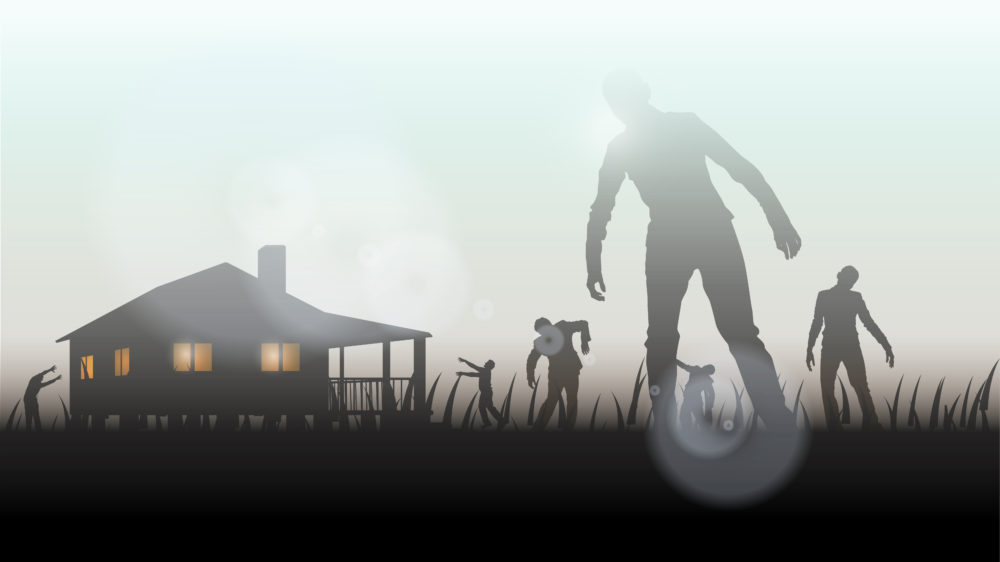
The Zombie Apocalypse is upon us! The government has collapsed. Communication is down. Chaos is the new order. What do you do? Who do you team up with? How do you survive? On Sunday, October 23, the premier of Season 7 of The Walking Dead (TWD) will air. What follows is a memorandum on how to embrace change and thrive in the unexpected, told through the lens of an improviser.
Before we begin, let’s acknowledge that most of us already live in a world based in VUCA (Volatility, Uncertainty, Complexity, and Ambiguity), at least in one form or another. It is also important to remember that in times of Crisis, Risk, Stress and Uncertainty, we fall back on our most overlearned behaviors. They are part of our muscle memory, and we rely on them. Because of that, we must remember to deliberately develop and strengthen a skill set that we can fall back on in turbulent times. Improvisation will be key to surviving a zombie apocalypse.
For this piece to work as a survival guide in a global, undead flesh-eater epidemic, we should define improv as “reacting, adapting and communicating.” However, the skillset needed to thrive in the unexpected and improvise effectively is much more complex than three buzzwords. In honor of the 7th season of The Walking Dead, here are 7 solid improv tenets that you can use to survive your own zombie apocalypse. Warning: Spoiler alert if you’re not up-to-date!
1) Be in the moment
- On stage, improvisers must be present. Everything happens in the here and now, and just like people watching a great episode of TWD, that’s where an improv show audience lives as well. As performers, we must remain focused in the moment.
- Season 1: Lead character Rick Grimes awoke from a coma to find the world he knew is gone. He had no context and no information, and he has to perform at the top of his intelligence, quickly understand his environment, and react, adapt, react, adapt, react. Rick’s police experience certainly came in handy, as he fell back on his training (i.e. his most overlearned behaviors).
2) Be Aware
- On an improv stage, great improvisers take in everything. This high level of awareness puts us in the position to intelligently pick and choose off of what we will react and adapt, whether it is the biggest action or the smallest detail. To do this quickly and in real-time, our observation and awareness skills must be dialed up to an insanely high level, otherwise we might miss something that the audience (who is playing along with us in the moment)
- Season 2. A season long buildup of tension between Rick and Shane, his best friend since high school, came to a climax when Shane lured Rick to a secluded area to kill him. However, Rick had high levels of awareness and his instincts told him Shane’s quest for power had driven him mad. The result: Shane died and Rick lived.
3) Postpone Judgment (“Yes, And…”)
- “Yes, And…” is the cornerstone of all improv, around the world. “Yes” is unconditional acceptance (of an offer, an initiation, a declaration) and “And” is building directly upon what was given to you and a bridge to your direct reaction. “Yes, And…” is a way to slow the brain down to gain a better understanding of a situation and postpone judgment to develop a comprehensive strategy.
- Season 3. After a grapple with power and authority, from which Rick tyrannically took control of the survivors, his entire group was in a fragile state. After playing the role of the sole decision maker for quite a while, Rick eventually decided to relying on a brain trust, or a leadership council. Though the decisions on how to proceed ultimately landed on his shoulders, he used the advice of his counsel to influence his decision making. Rick’s choice to include others was essential in the group’s unity, especially as circumstances for survival got more and more dire.
4) React & Adapt
- Early in my improv career I was taught “Don’t be clever. Don’t be creative. Be honest and be in the moment.” This direction suggested that by relaxing and simply reacting, natural intelligence will rise to the surface and the cleverest and most creative ideas will come from simply reacting honestly to a committed situation. However, a reaction can only take you so far. The trick to succeeding on an improv stage is the marriage of reacting with adapting. After the initial reaction there is a series of counter-reactions and course correcting made in real time. This is adaption – the very core of the phrase “make it work.”
- Season 4: In an entire season of dynamic, rapidly changing and chaotic environments, Rick’s ability to react and adapt was put to the test when a group of post-apocalyptic scumbags jumped Rick and company and held a knife to the throat of Rick’s son, Carl. When forced to watch the near rape of his son at gunpoint, Rick did not hesitate to react and adapt. He bit out the jugular of his gun-holding kidnapper, took a gun and a knife and inspired his team to revolt against their captures and regain their freedom and his son’s safety!
5) Make Initiations
- Though we rely heavily on reacting and adapting, if no one initiates the improvisation, the scene will never begin. You need that initial action to cause a reaction to which you can adapt. Be it a verbal or physical declaration, an initiation that leads to reaction and adaption is the secret behind how improvisational comedy spontaneously erupts in real time.
- Season 5: Rick and the gang found themselves in the quant, untouched settlement of Alexandria. Unable to convince the over-falsely secured citizens that a living hell will eventually break down their walls, Rick makes the initiation of bringing the future to the present by killing walkers that snuck in through an agape gate and presenting the dead bodies at the community gathering. Rick’s initiation helped force the folks of Alexandria to approach their lives differently.
6) Communicate
- Improvisation is a communication based art form by nature. Communication is the heart of every performance, and great communication, based in the previous five points, is the key to an amazing improv show. Whether verbal or silent, improvisers communicate throughout an entire show, with each other and the audience.
- Season 6. To execute a plan to herd thousands of walkers from a quarry and away from Alexandria, Rick and his team prepped extensively. However, when the group headed out for their first dry run, unexpected events forced the group into immediately carrying out the plan. The team communicated through constant radio contact and relied on each other to adapt when the plan needed real-time tweaking to succeed.
7) Rely On Your Team
- Improvisation is a team sport, and elite improvisers value the team and the individuals within the team even more than they value their own talent. This creates a selfless style of play wherein the team, the performance and the show are more important than any one individual. Ego is set aside, ideas are shared, and best practices are actualized. It is through this universal approach that the collective “We” is stronger than the individual “I”.
- Season 7: Over six seasons, Rick and his crew have worked as a team to clear buildings of walkers, shore up walls, defeat enemies, and defend territories and have become an ever-bonding family. However, the Season 6 cliffhanger ending made it clear – Rick and team are facing a threat unlike anything they’ve encountered. New nemesis Negan and his massive gang of murderous ‘Saviors’ trapped Rick’s team like rats in a maze and death looks eminent. To withstand this deadly enemy, Rick’s crew must depend on each individual team member, and perhaps some new allies, to rally together. They must rely on each other to survive.
Starting in Volatility, Uncertainty, Complexity, and Ambiguity, Season 7 is guaranteed to bring a whole hell of a lot of Crisis, Risk, and Stress. However, Rick has created a communicative and adaptable team, whose most overlearned behaviors are based in improvisation.
How will Rick and his team survive? I can’t wait to find out on Sunday, October 23 on AMC!

